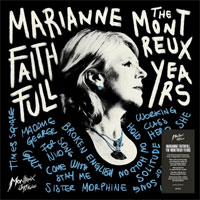Marianne Faithfull • The Montreux Years
 his is part of the
second release of material from the vaults of the Montreux Jazz Festival, which includes
over 5000 recordings of some of recent history’s greatest jazz and popular music.
BMG’s first two Montreux releases featured performances by Nina Simone and Etta
James; BMG has followed up with Marianne Faithfull and Muddy Waters recordings. Each of
these four releases is available in LP and CD editions. Each one is excellent, but the
Simone and now the Faithful collections are among the best albums released in 2021. his is part of the
second release of material from the vaults of the Montreux Jazz Festival, which includes
over 5000 recordings of some of recent history’s greatest jazz and popular music.
BMG’s first two Montreux releases featured performances by Nina Simone and Etta
James; BMG has followed up with Marianne Faithfull and Muddy Waters recordings. Each of
these four releases is available in LP and CD editions. Each one is excellent, but the
Simone and now the Faithful collections are among the best albums released in 2021.
The Montreux Jazz Festival was started by Claude Nobs (with help from Atlantic Records) in 1967 and has been one of the world’s premier annual music festivals. For a couple of weeks each summer, a quarter million fans descend on Lake Geneva, in Switzerland, to hear legendary performers. The festival quickly outgrew the jazz limitation and now has several hundred performances each year on almost a dozen stages, over half of which are free. But it wasn’t always that way. It started relatively small, with performances of mostly jazz at the Montreux Casino, lasting a few days. Miles Davis, Bill Evans, Charles Lloyd, and Ella Fitzgerald led the way, but by the early 1970s the festival had expanded to an equally impressive lineup of the biggest names in pop music. In December 1971, Deep Purple was preparing to take over the casino building to record, but the hall was burned to the ground when an audience member at a Frank Zappa concert set off a flare. Deep Purple’s song “Smoke on the Water” immortalized the disaster and (for those too far away to attend) the festival. While the Montreux Festival was experiencing its growth spurt, Marianne Faithfull was becoming a pop phenomenon. She burst on the scene with “As Tears Go By” and was famous for her very public romance with Mick Jagger in the late 1960s. Following a period of drug addiction, anorexia, homelessness, and laryngitis in the 1970s, she reemerged in 1979 with the album Broken English. To anyone expecting Faithfull to continue the nostalgic tripe of “As Tears Go By,” the sound and style of this new album was either a slap on the face or a wakeup call. Where “Tears” reeks of crass commercialism, with its unchallenging lyrics about retrospection without evolution, Broken English not only breaks the rules but spits in the face of rock’s misogynist credo. Even before the blunt, sexually explicit lyrics take hold, Faithfull’s new sound grabs your attention. Gone is the sweet, high-pitched, lilting sound of her youthful voice, replaced by a gravelly, low-pitched ravaged vocal wreck, sounding more like Tom Waits than a perky British Invasion ingénue. That New Wave rock album was sonic ferocity, with John Lennon’s “Working Class Hero,” and “Why D’Ya Do It,” the very X-rated complaint to an unfaithful lover, representing its most intense moments. At the same time, it’s an entirely accessible album -- so long as you are not looking for easy pop. The Montreux Years is a compilation of Faithfull’s performances between 1995 and 2009. It includes three tracks from Broken English (the title track plus the two previously mentioned tracks). She sings “Sister Morphine,” which she co-wrote with Keith Richards and Mick Jagger, and then had to go to court when they dropped her from the credits. Her cover of Leonard Cohen’s “Tower of Song” is as good as anyone else’s, and her rendition of Van Morrison’s “Madame George” is mesmerizing. The engineering is about as good as it gets for live
performance. Even though the songs are compiled from five performances in two different
halls, the sound is remarkably uniform, and uniformly excellent. The album was mastered by
Tony Cousins at Metropolis Mastering in London from digital sources and pressed at Pallas
in Germany. This has become my favorite Marianne Faithfull album, and that makes it (for
me) a desert-island choice. The LPs have been in constant rotation on my turntable, and
the CD version on my car's CD player. |
